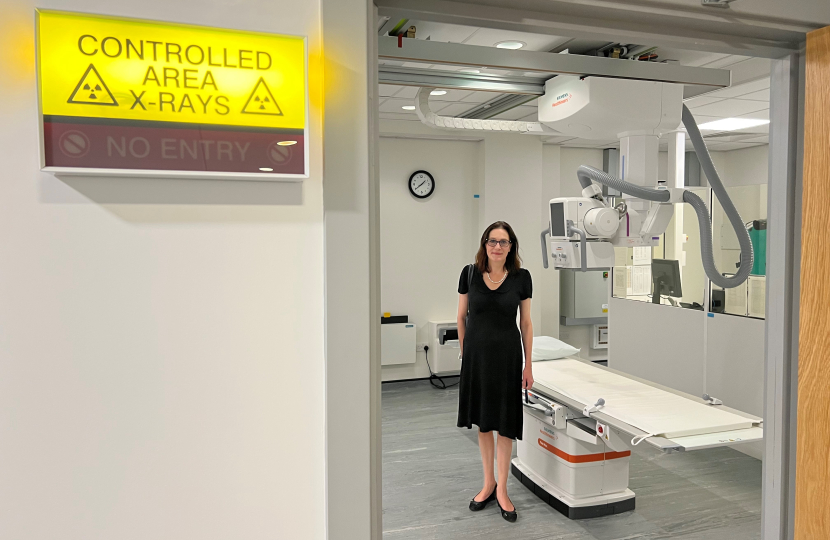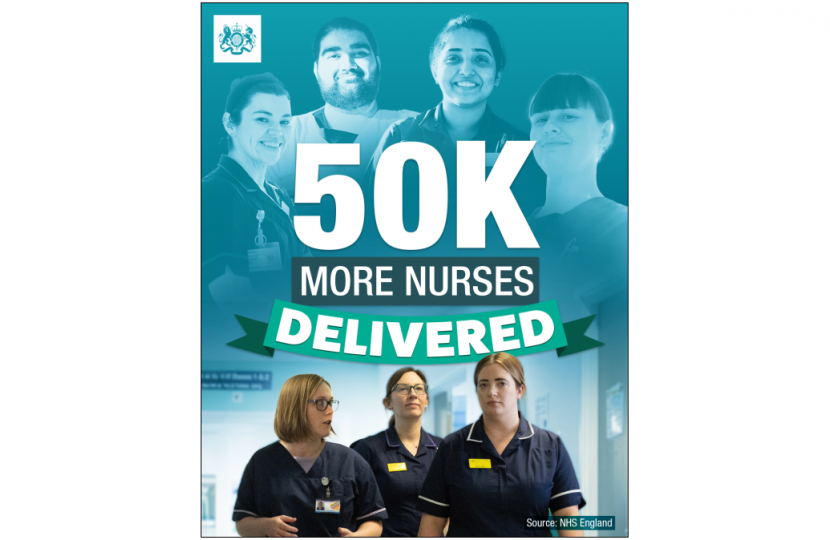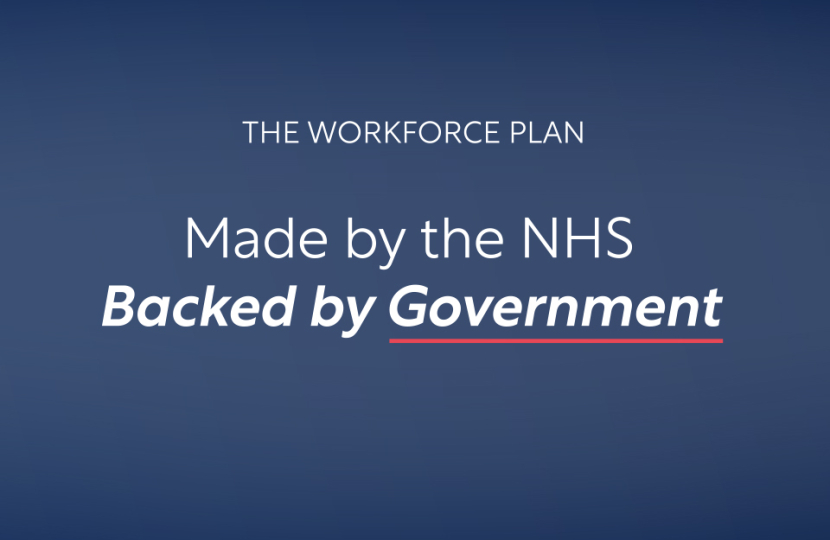The NHS is still recovering from the pandemic but has 42,000 more doctors and 71,000 more nurses than under Labour with 250 more doctors and 400 more nurses for every month we’ve been in office. Resources matter, which is why, despite all the economic shocks we have faced, overall spending on public services has gone up since 2010 – in the case of the NHS by over 33% in real terms.
LOCAL ACTION
In our area, waiting lists are falling, time to diagnosis for cancer patients are getting shorter, A&E wait times are getting shorter and ambulance performance has improved. To deliver this, the Mid and South Essex Integrated Care Board has been allocated £2.27 billion for 2024/25.
108 Community Diagnostic Centres have also been created across the country which have delivered 3.8 million tests and procedures and our closest will be based in Southend and Pitsea. In our area, we have also seen a further £8 million invested into A&E services alongside a surgical day unit at Southend Hospital and a further £110 million investment at Basildon, Broomfield and Southend Hospitals. Once opened, the day unit will offer a further 5,600 procedures a year, helping reduce patient waiting lists.
The Canvey X-Ray has also finally re-opening, I know many residents have been eagerly waiting for this news and I urged the NHS teams to get this up and running as quickly as possible and I was pleased to be shown the completed work. Along with the other new additional services being offered at the Canvey Primary Centre it will make a huge difference to people right across the Borough accessing these vital services, reducing waiting times, allowing more tests to take place and most importantly all happening closer to home.
RECORD NHS FUNDING
The Spring Budget 2024 announced that the Government is protecting the day-to-day funding of the National Health Service in England, providing an extra £2.45 billion in 2024/25. This will allow the NHS to continue to focus on reducing waiting times and bring the NHS’s resource budget in 2024/25 to £164.9 billion. This means that NHS funding will increase from 2023/24 and equates to a real-terms increase of 13% since 2019/20. Our NHS is set to be in receipt of £1 billion more per week than in 2016.
An additional £3.4 billion of capital funding was also announced at the 2024 Budget to aid the NHS’ technological and digital transformation between 2025/26 and 2027/28. This will slash the 13 million hours lost due to outdated It systems, will use AI to cut in half the form filling currently done by doctors, will digitise operating theatre processes allowing 200,000 more operations per year, will help read scans more accurately speeding up 130,0000 results and ensure all hospitals use electronic records.
REDUCING WAITING LISTS
The Government and NHS has published a series of recovery plans. These cover;
- Operations and Elective Care - www.england.nhs.uk/coronavirus/delivering-plan-for-tackling-the-covid-19-backlog-of-elective-care/
- Urgent and Emergency Care - www.england.nhs.uk/wp-content/uploads/2023/01/B2034-delivery-plan-for-recovering-urgent-and-emergency-care-services.pdf
- GPs and Specialists in Primary Care - www.england.nhs.uk/long-read/delivery-plan-for-recovering-access-to-primary-care-2/
The NHS is performing a record number of appointments, tests and procedures well above pandemic levels. The Government’s Health and Care Act 2022 has created new Integrated Care Systems which convene all local NHS services, social care providers and the local authority to commission new services to ensure the needs of the area are met far quicker. This will reduce pressure in A&E across the country as more people receive the preventative healthcare they need, keeping them out of hospitals altogether.
The Government is improving A&E and ambulance performance, with targets for 76% of patients being admitted, transferred or discharged within 4 hours by March 2024 and improved ambulance response times for Category 2 incidents to 30 minutes on average over 2023-24. Further improvements against both measures back towards pre-pandemic levels are planned for 2024-25.
Nationwide, £1 billion has also been invested to provide an additional 5,000 hospital beds, 800 ambulances on the road and over 10,000 are now being treated through new virtual wards so that people can be monitored from their own home. The £1.6 billion Better Care Fund in discharge funding will make sure that patients are able to leave hospitals as soon as they are able to reduce bed blocking and reduce waiting times.
NHS LONG TERM WORKFORCE PLAN
The NHS Long Term Workforce Plan was announced last year and is the first of its kind – a plan asked for and created by the NHS itself and backed by £2.4 billion of government investment to ‘Train, Retain, Reform’.
It sets out really ambitious proposals including a doubling of medical school places, increasing GP training by 50% and dentists by 40% and an aim for 130,000 fewer staff leaving the profession over the next 15 years by making the NHS a more attractive career to pursue. Most recently, the Government abolished the lifetime allowance on pensions to make sure those who want to work within the health service are not penalised for doing so.
The Government has now delivered its manifesto commitment of an additional 50,000 nurses working in the service who are performing a record number of procedures. The plan also includes proposals to recruit 60,000 more doctors, 170,000 more nurses and 71,000 more healthcare professionals by 2036/37. There is also an additional £7.5 billion allocated to social care for 2023-25 to ensure they have the resources needed to care for a growing number of people.
NHS PAY UPLIFTS
I know that we all value the work that the NHS carries out and so I am pleased the Government last year accepted in full the recommendations of the independent pay bodies. This meant that most doctors and dentists received a 6% pay rise last year. Over 1 million staff, including nurses and paramedics, received a pay rise of 5% and two one-off payments worth on average over £2,000. Junior doctors also received a 10.3% uplift, with the offer of further discussions about improving working conditions, to end the strikes we have seen. The discussions for the 2024/25 pay settlement are now underway.
PHARMACY FIRST PROGRAMME
Patients can now get treatment for seven common conditions directly from their local pharmacy, without the need for a GP appointment or prescription. The Pharmacy First scheme was launched by the Government and NHS England at the start of 2024 to give patients quick and accessible care and ease pressure on GP services. This will enable community pharmacists to supply prescription-only medicines, including antibiotics and antivirals, to treat seven common health conditions without the need to visit a GP – Sinusitis, Sore throat, Earache, Infected insect bite, Impetigo, Shingles and uncomplicated Urinary Tract Infections in women.
DENTAL RECOVERY PLAN
The Government’s new plan aims to make sure everyone who needs to see a dentist, particularly those who have been unable to access care in the past two years, will be able to do so.
Dentists will be offered a ‘bonus’ to take on more NHS patients which will create more than 2.5 million new appointments in the next year. They will also be offering ‘golden hello’ cash incentives for dentists to come and work in areas that are under-served. This will allow around 1 million new patients access to NHS dental treatment, who may previously have been unable to access the dental care they need. From later this year, up to 240 dentists will be offered £20,000 to stay and deliver NHS care for at least three years in areas where recruitment and retention of dentists is difficult. This plan is supported with £200 million to ensure everyone has fast and fair access to a dentist when they need one.
SMOKE-FREE GENERATION
Smoking is the single biggest entirely preventable cause of ill-health, disability and death. It leads to 80,000 deaths a year in the UK, and is responsible for 1 in 4 cancer deaths, and over 70% of lung cancer cases. Smokers lose an average of ten years of life expectancy. Firstly, the Government will create the first smoke-free generation so children turning 15 this year or younger will never be legally sold tobacco through the Tobacco and Vapes Bill. The age of sale will be raised by one year each year to prevent future generations from ever taking up smoking, as there is no safe age to smoke.
To reduce the appeal of vapes to children, the Government also announced new powers will be introduced to restrict vape flavours and packaging. The powers will also allow government to change how vapes are displayed in shops. They will also bring in quicker and simpler £100 fixed penalty fines for shops which sell vapes illegally to children. Trading standards officers will be empowered to act ‘on the spot’ to tackle underage tobacco and vape sales. This builds on a maximum £2,500 fine that local authorities can already impose. Vaping alternatives - such as nicotine pouches - will also be outlawed for children who are increasingly turning to these highly addictive substitutes.
MENTAL HEALTH SUPPORT
The Government is investing £2.3 billion of additional funding a year to expand and transform mental NHS health services, so an extra 2 million people can get mental health support. More than £400 million to improve mental health facilities, including by giving patients the privacy of their own bedroom. An additional £150 million will be used to build new facilities to support mental health urgent and emergency care services, including £7 million for specialised mental health ambulances and funding for new crisis cafes, crisis houses, mental health urgent care centres and health-based places of safety. Funding for mental health is expected to increase to 8.9% of NHS funding.
This will also help an additional 345,000 children and young people to access NHS-funded mental health support. Spending on mental health services for children and young people has also increased, with spend of around £1.1 billion planned in this financial year. There is a Mental Health Support Team attached to almost all of our schools in Castle Point and this means they are receiving help from a dedicated NHS team to deliver this service.
The draft Mental Health Bill is intended to modernise the Mental Health Act so that it is fit for the 21st century and works better for people with serious mental illness. The draft Bill has completed its pre-legislative scrutiny and Ministers are considering the Committee’s recommendations carefully and will introduce the Bill when parliamentary time allows.



